We have all, at one point in time, thought to ourselves, "I could've handled that situation better."
"Hindsight is 20/20," but hopefully, you didn't have to say it too often and learned from it. However, many of us are feeling added pressure right now with the many changes going on in our lives. So, how can DISC help you to better manage how you react in pressure situations?
In the best of times, adjusting your behaviors typically takes rational thinking, time and, effort; something we tend not to have in pressure situations. The first step towards handling pressure more effectively is to recognize your natural behaviors; how you tend to do things. Now you have a reference point in order to prepare for and manage how you react.
How styles react to pressure situations
Under pressure you are likely to revert to your natural behavioral style and began to exhibit those behaviors even more. You tend to lose your ability to modify your behaviors. And, as pressure increases, you may overuse your natural style and begin to show the negative aspects of it. Different styles react and respond to pressure situations differently.
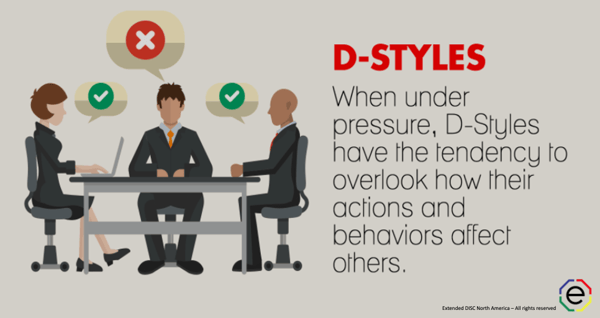 As a D-style, you may feel frustrated when things seem to be moving too slow, you're not in control, or you have limited room for flexibility. Under pressure, you may have a shorter fuse, become a poorer listener, and having the tendency to overlook how your actions and behaviors affect others.
As a D-style, you may feel frustrated when things seem to be moving too slow, you're not in control, or you have limited room for flexibility. Under pressure, you may have a shorter fuse, become a poorer listener, and having the tendency to overlook how your actions and behaviors affect others.
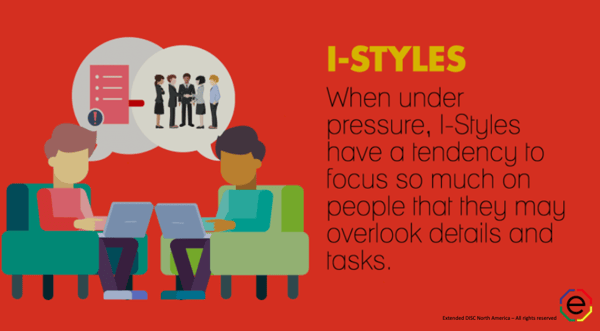 As an I-style, you tend to feel more frustrated when you lose your ability to influence and interact with others. You may be more irritated with daily routine and structure. Unpleasant or routine tasks are to be avoided because they drain your energy. Under pressure, you have a tendency to focus so much on people you may overlook details and tasks. You may begin to over-promise, become disorganized, too trusting or too emotional.
As an I-style, you tend to feel more frustrated when you lose your ability to influence and interact with others. You may be more irritated with daily routine and structure. Unpleasant or routine tasks are to be avoided because they drain your energy. Under pressure, you have a tendency to focus so much on people you may overlook details and tasks. You may begin to over-promise, become disorganized, too trusting or too emotional.
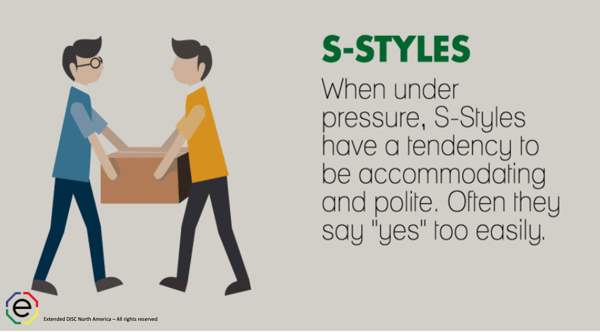 As an S-style, you may feel frustrated if you are not part of a team, in an unstable environment or have unclear responsibilities. Under pressure, you may become overly accommodating; saying 'yes' too easily. You may be more resistant to change, not openly share your opinions, or take things more personally.
As an S-style, you may feel frustrated if you are not part of a team, in an unstable environment or have unclear responsibilities. Under pressure, you may become overly accommodating; saying 'yes' too easily. You may be more resistant to change, not openly share your opinions, or take things more personally.
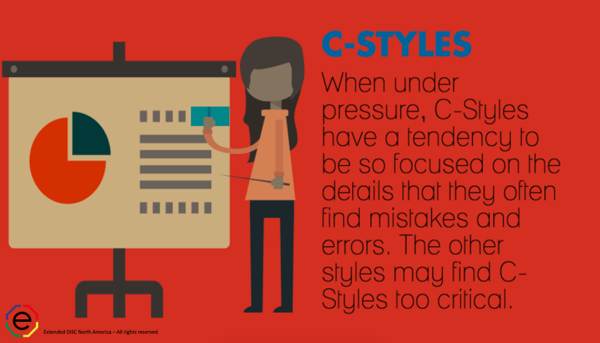 As a C-style, you may feel frustrated when there is a lack of information, unclear guidelines, and non-systematic ways of working. You may begin to over-analyze; coming across as overly-critical and looking for every mistake. You may not be comfortable expressing your feelings, hesitate to take action, and become unyielding when following the rules.
As a C-style, you may feel frustrated when there is a lack of information, unclear guidelines, and non-systematic ways of working. You may begin to over-analyze; coming across as overly-critical and looking for every mistake. You may not be comfortable expressing your feelings, hesitate to take action, and become unyielding when following the rules.
What are your reactions to pressure situations?
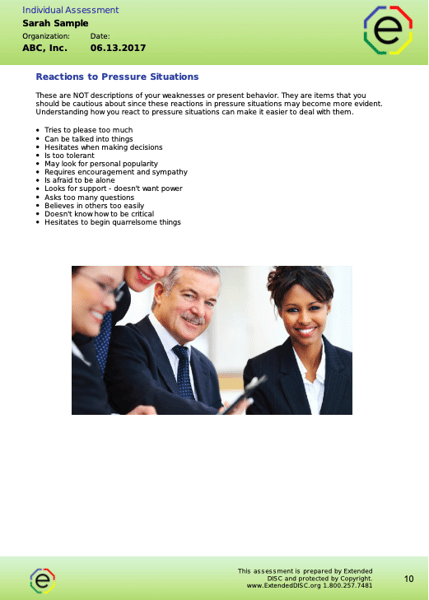 The results of your Extended DISC® Questionnaire identifies how your style tends to show up in pressure situations. Specifically, the 'Reactions to Pressure Situations' section explains how you may behave or react in a pressure situation. The items listed do not apply to every setting nor are they a description of your present behavior. They are not your weaknesses, but you should be cautious because they tend to show up when you feel pressured. However, experience, different settings, and practice also needs to be factored in.
The results of your Extended DISC® Questionnaire identifies how your style tends to show up in pressure situations. Specifically, the 'Reactions to Pressure Situations' section explains how you may behave or react in a pressure situation. The items listed do not apply to every setting nor are they a description of your present behavior. They are not your weaknesses, but you should be cautious because they tend to show up when you feel pressured. However, experience, different settings, and practice also needs to be factored in.
When you are aware of how you tend to react to pressure situations, then you can be more prepared for the future. Think about a time you were feeling pressure. Did your reaction got you into trouble or do you think you could have handled it more effectively? Now, consider how could you be more aware or practice if it happened again?
Now you have a definitive starting point to be proactive and more aware so you don't repeat past mistakes and you have more effective reactions to pressure situations.
What's next?

In theory, alleviating stress is a simple process. First, be more aware of the situations that tend to cause you stress so you can better prepared for them. Second, be aware of your natural reactions to pressure so you can better control and modify your behaviors effectively. Finally, learn what factors tend to alleviate your stress to help you cope and recover faster.
In reality, modifying your behaviors takes effort; even more so when you feel pressure. However, once you are more aware, it gets easier. You begin to realize when your natural reaction can make things worse and when you're better off changing it. In fact, your behaviors are usually the only things you can change. You will achieve a better outcome, feel better, and others around you will feel better too.
Ultimately, be comfortable with who you are! The conscious adjustments you need to make are often brief and temporary. The modifications you practice can make a huge impact on your ability to manage and succeed.
